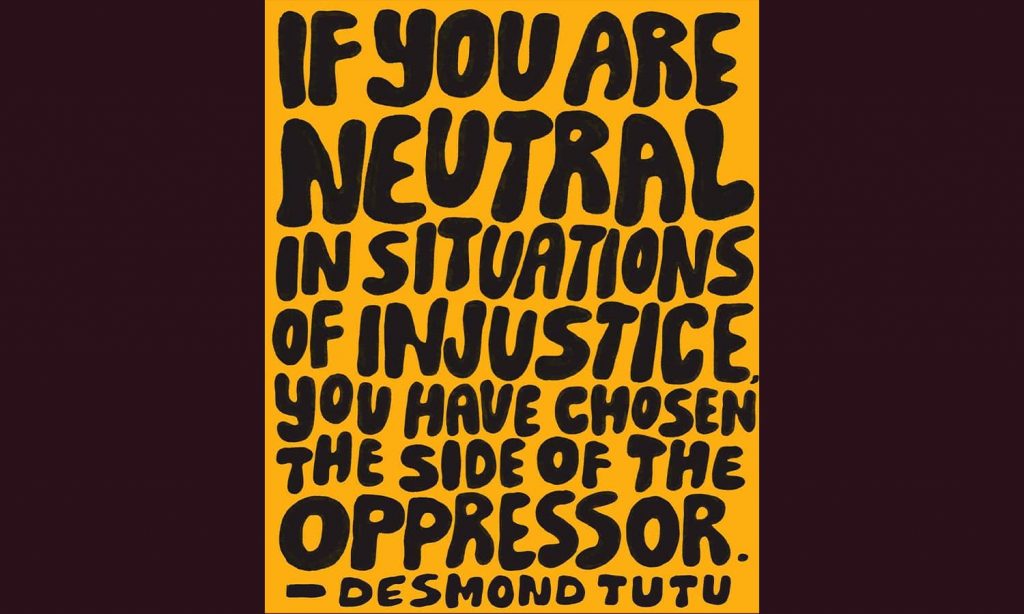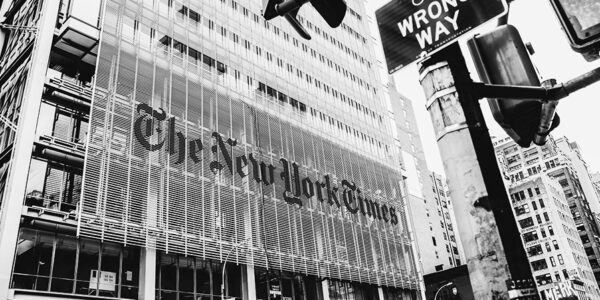The murder of 46-year-old Black man, George Floyd in Minnesota, sparked global outrage, and rightfully so. It’s a wake up call for many to learn more about, and fight against, racism that has existed for far too long. To pay attention, and deep dive into a range of different resources. To use our collective platforms to combat issues of racism not just in the US, but in Australia and around the world.
Black Lives Matter protests across the US and the world have sparked a global discussion on how white people can be better advocates for Black communities.
Here, we’re outlining a handful of ways to be an anti-racist ally not only in times of hardship, when racism is the focus of the global news cycle, but indefinitely.
This list is composed of advice and resources from fellow publications, journalists and activist groups. Being an ally means continually learning and educating yourself and those around you on the ways we can help and support marginalised communities.
If there is something missing from this list, we want to hear from you. Please DM us on Instagram or email [email protected] and we’ll continue to update this story.
Understand and acknowledge your privilege
In a profound Instagram post, British model and activist Munroe Bergdorf explained the important need to acknowledge one’s position of privilege.
“We need to shift the perspective of oppression being the problem of those who experience it. We need to acknowledge that privilege exists as a spectrum and is an indicator for where the work needs to take place.
“Expecting marginalised folk to be the ones to deconstruct their own oppression is as good as saying ‘not my problem’ and letting it happen, as it doesn’t acknowledge where the problem is coming from. The definition of privilege is thinking that something isn’t a problem because it isn’t YOUR problem,” she wrote.
Carefully read through her post below for a comprehensive guide to understanding white privilege.
Educate yourself
Documentaries, films, essays, books, research papers, podcasts; there are endless resources available to help you better understand current affairs as well as the history of racial issues around the world. Read, watch, and listen to these.
To educate yourself on the issues of marginalised communities may also mean asking questions and paying attention to the answers. Knowing when to simply listen and not offer up your opinions is key to forming a better understanding of a community’s collective pain. But please note there can be a right way to go about questions you may have for others.
In a 2017 article entitled ‘For our white friends desiring to be allies‘ for Sojourners, author Courtney Ariel explains the nuances in asking your marginalised or disenfranchised friends questions. She encourages curiosity around topics you’re unsure of, but to always put in the time to learn as much as you can about that topic before asking questions.
“Some marginalised/disenfranchised folks will tell you not to ask them anything; don’t be offended by that. Folks are tired, and that is understandable because it is exhausting to be a marginalised person in this world.
“In a nutshell, don’t expect for people to educate you. Do the work to educate yourself. Ask questions within relationships that feel safe, and do so respectfully,” she writes.
In addition, work to understand the similarities between the current situation in America, that despite feeling far away, hits close to home for indigenous Australians and reflects Australia’s Black history. “Our struggles are entwined and united. If you want to support ‘Black Lives Matter’, support it in this country too,” journalist Amy McGuire wrote in a profound piece on her blog recently, that you must read.
Engage and use your platform
While social media is an effective tool for spreading a message and fast, it is worth noting that not all content is deemed helpful, even if the intent is there.
If you are looking to share content on social media, avoid re-distributing viral videos and images that can be triggering and traumatic, and instead, use your platform to share helpful resources that can help educate and inspire change. Scroll through the post below for a helpful guide to the questions you may wish to ask yourself before posting on social media about issues of racism.
Beyond social media, engage in real-life conversations with your family, your friends. Do this now and long into the future.
Show up
Two peaceful protests are taking place in Sydney alone this week. The ‘Stop Aboriginal Deaths in Custody & George Floyd Peaceful Protest‘ on June 2 will be held in Hyde Park from 5pm, while the ‘Stop All Black Deaths in Custody: Vigil for George Floyd‘ on June 6 will commence at 3pm in Chippendale.
If you can make it, your attendance at these events symbolises your own intolerance for Black deaths and unjust racial discrimination in Australia within the indigenous and BIPOC communities. Wear a mask, and adhere to social distancing restrictions to ensure your own safety as well as others’. Rally your friends and be on the right side of history.
Another way you can show your support is by signing petitions. With 9.5 million signatures, the Justice for George Floyd petition on Change.org is currently the largest in the platform’s history, though it could do with your signature, too. The petition’s aim is to grab the attention of Mayor Jacob Frey and DA Mike Freeman, to “beg to have the officers involved in this disgusting situation fired and for charges to be filed immediately”.
Black Lives Matter has collated a number of additional petitions to sign on the pursuit of change.
Donate
If you’re in a position to donate money, please consider doing so. The Minnesota Freedom Fund is helping to free incarcerated protesters by paying bail or legal fees, and there are a number of similar funds working to do the same, as outlined in this extensive and growing Google Doc.
If you wish to donate directly to the George Floyd Memorial Fund, you can do so via GoFundMe, while a donation to Black Lives Matter contributes to the ongoing “fight to end state-sanctioned violence, liberate Black people, and end white supremacy forever”.
If a monetary donation is unfeasible for you in this time, donate your time instead. Spend your time engaging in the above by reading up on the history of racial issues in both Australia and across the world. Donate your time to reading books about Black lives watching films that tell the past and present stories of the Black experience, like If Beale Street Could Talk, and When They See Us.
Continue to show your support in the long-term
Mirelle Harper, an editor and freelance writer in the UK, has shared the importance of supporting beyond this period of outrage and strategising change for the long term.
“How are you making a long-term impact or affecting change? Can you mentor a young person? Can you become a trustee for an organisation that supports a Black community? Could you offer your time to volunteer? Make the effort to do something valuable over a long-term period,” she penned in an Instagram post outlining 10 steps to non-optical allyship (below).
In addition, you must push forward and persevere in allyship long into the future. As Courtney Arial writes in her article for Sojourners, “Above all, I urge you keep trying. You’re going to make mistakes; expect this. But keep showing up. Be compassionate. Lead with empathy, always. Keep learning and growing. If you do this, I truly believe you’ll be doing the work of an ally.”
Resources
We’ll continue adding to this list of additional resources below:
For Our White Friends Desiring to Be Allies, by Courtney Ariel
Racial Equity Tools
Aboriginal Deaths in Custody, article from Mamamia
List of Petitions to Sign on Black Lives Matter
Anti-Racism Resources for White People







